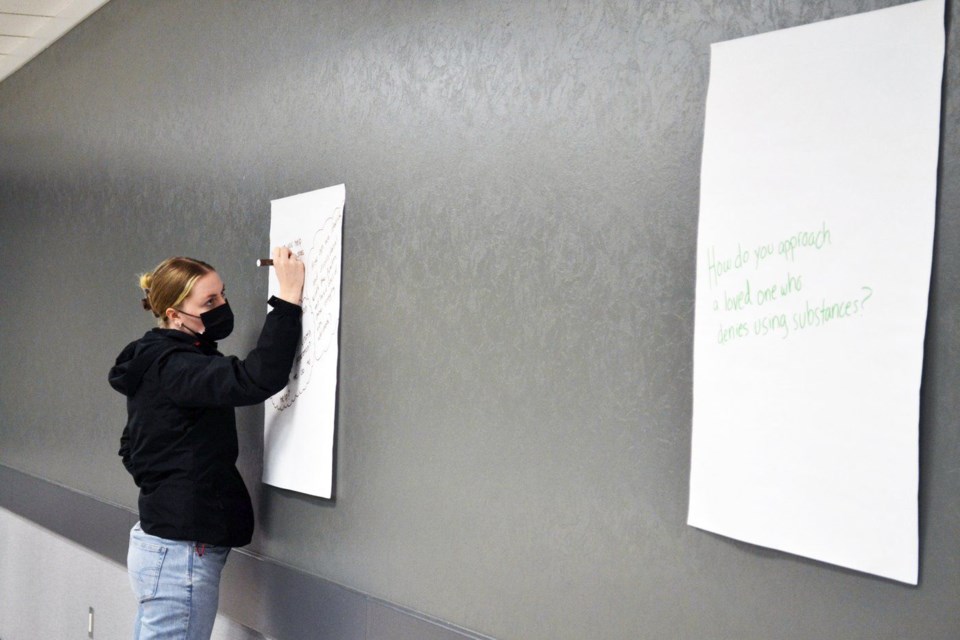PRINCE ALBERT - Prince Albert families affected by substance abuse will now have easily accessible local resources and reliable information at their fingertips thanks to a University of Saskatchewan project that’s five years in the making.
The Substance Use Disorder Education Toolkit for Families affected by addiction in Prince Albert, Sask. was launched at the Prince Albert Exhibition Hall on November 2, with presentations by Cameron Friesen with the Saskatchewan Health Authority, retired family counsellor and child protection worker John Kreiser, and Director of Education for Sask. Rivers School Division Robert Bratvold.
Around 60 people were in attendance, including clergy members, the Mayor of Prince Albert, local school officials, USask nursing students, members of al-anon, victim service agency workers, and Catholic Family Services.
Throughout the event, the participants took time to share information amongst themselves and brainstorm ideas on how to implement strategies and make sure the toolkit is available to those that need it. Some suggestions on where to house the toolkit include pharmacies, the Friendship Centre, post-secondary schools, and harm reduction sites.
“We have the highest per capita of alcohol consumption in cities approximately the same size… Even Saskatoon, we’re higher than them,” said Friesen. “We have almost double the amount of alcohol consumption compared to the national average, as well as Saskatchewan; we definitely like to indulge and with that comes consequences.”
Kreiser said on his first week on the job working in the addictions field, he was told that “alcoholism is a family disease… Every family member deserves the opportunity for recovery.”
“I can give you all kinds of horror stories and statistics about how much of an impact it has on children and families, I’ve seen it all,” said Kreiser. “However, I want to leave you with this message. There is hope and recovery available, it’s happening every day in our community here in Prince Albert.”
The project began with a knowledge exchange meeting in June of 2017 between Dr. Geoffrey Maina, Associate Professor at the Prince Albert Campus of the USask College of Nursing, his colleagues, local professionals, and community members to get an idea of what their thoughts were on substance use in Prince Albert.
During the discussion, the group of 60 individuals came to the realization that they did not know what resources were out there for people facing addictions, if the city was lacking them or if they were just not well known.
“There was a gap,” said Friesen. “How easy is it for family members of loved ones to access services? That’s where it started off.”
Maina then sought a research grant to fund the project and “Exploring the Needs for Developing Interventions for Families Affected by Addictions within Prince Albert” was born.
Because the group wanted the research to be Prince Albert specific and focus on the experiences of family members, how they are 小蓝视频 affected and what is available out there for them, 21 local individuals were interviewed for the project.
Ten of those participants were recognized as having siblings, spouses, parents, or other loved ones that were dependent on harmful substances, said Friesen.
“Everybody has their details different, but the story is all the same,” he said. “They are all affected.”
In 2019, the group met again to discuss the results of the interviews and a working group was formed to develop an intervention per the group’s recommendations. The project was put on hiatus during the COVID-19 pandemic, but it was not forgotten. Through zoom meetings, the group was able to create a toolkit packed full of local resources that can be easily accessed by everyone.
The Substance Use Disorder Education Toolkit is a 50-page long booklet featuring real quotes from Prince Albert locals, early signs of substance use, self-care practices for individuals who have a loved one with addictions, treatment options, information about harm reduction services in Prince Albert, overdose prevention and how to manage an overdose, and many other resources specific to the local community.
A short-form information card was also created alongside the toolkit, with phone numbers to call in a crisis, or for family members that are looking for support. The complete document will be available on the Prince Albert Alcohol Strategy website in the near future.




